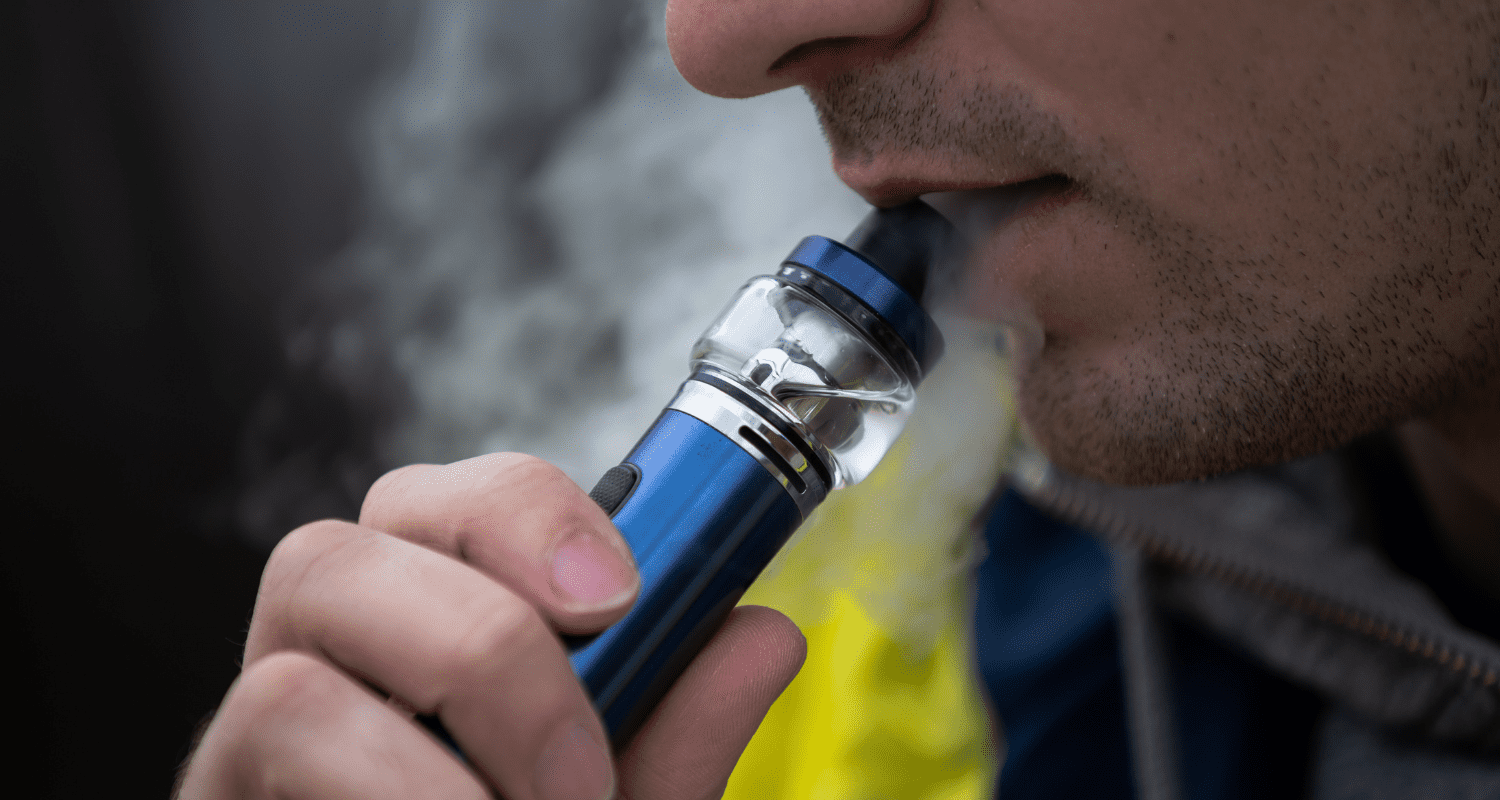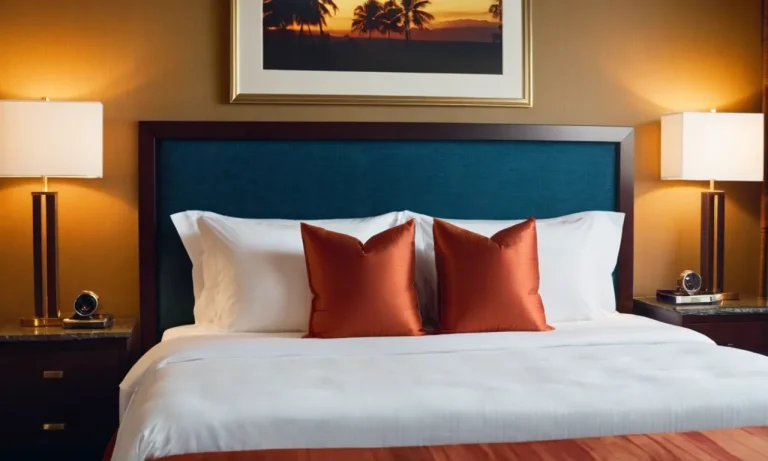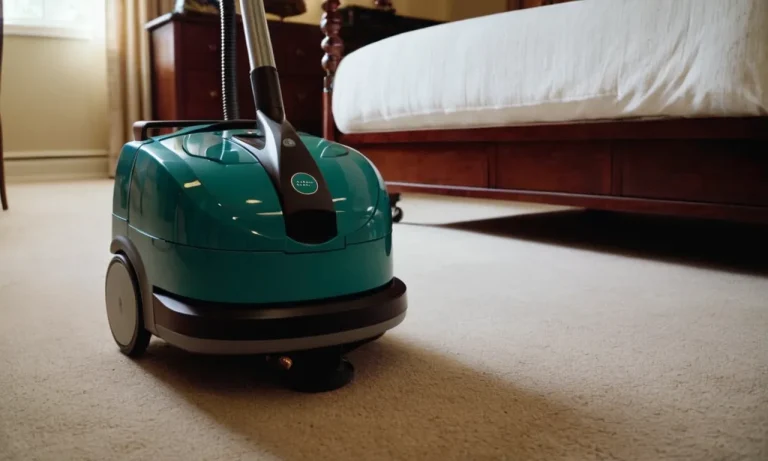Can Hotels Detect Vaping? A Comprehensive Guide
In the age of health-conscious living, vaping has emerged as a popular alternative to traditional smoking. However, as vaping becomes more widespread, concerns arise regarding its legality and acceptability in various settings, including hotels.
If you’re planning a trip and wondering whether you can indulge in your vaping habit without raising any red flags, this article is for you.
If you’re short on time, here’s a quick answer to your question: Yes, many hotels have implemented measures to detect vaping on their premises, as it can trigger smoke alarms and potentially cause damage to property. However, the extent of detection methods and policies varies among different hotel chains and locations.
In this comprehensive guide, we’ll delve into the intricacies of vaping detection in hotels, exploring the various techniques employed, the potential consequences of getting caught, and strategies to navigate this issue responsibly. Whether you’re a seasoned vaper or simply curious about the topic, this article will provide you with valuable insights and practical tips.
Smoke Detectors and Vaping Detection
How Smoke Detectors Work
Smoke detectors are designed to detect the presence of smoke particles in the air, which can be an early indicator of a fire. There are two main types of smoke detectors: ionization detectors and photoelectric detectors.
Ionization detectors use a small amount of radioactive material to ionize the air between two electrodes. When smoke particles enter the chamber, they disrupt the flow of ions, triggering the alarm.
Photoelectric detectors, on the other hand, use a light source and a sensor to detect smoke particles that scatter or obscure the light beam.
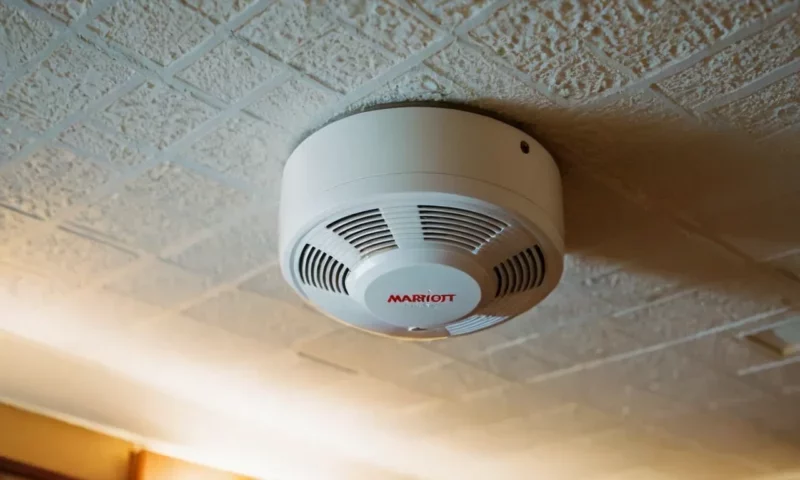
Detecting Vape Aerosols
While smoke detectors are primarily designed to detect smoke from fires, they can also be triggered by vape aerosols or vapor produced by electronic cigarettes and vaporizers.
This is because the aerosol particles can scatter light or disrupt the ionization process in a similar way to smoke particles. However, it’s important to note that not all smoke detectors are equally sensitive to vape aerosols.
According to the National Fire Protection Association (NFPA), photoelectric smoke detectors are generally more sensitive to vape aerosols than ionization detectors. The sensitivity of smoke detectors to vape aerosols can vary depending on factors such as the type of vaping device, the e-liquid composition, and the amount of vapor produced.
Some hotels have even installed specialized vape detectors or vape sensors that are designed specifically to detect the presence of vape aerosols.
These devices can be integrated with the hotel’s security system and can trigger alerts or notifications to staff when vaping is detected in non-smoking areas. Isn’t it amazing how technology is evolving to address new challenges?
False Alarms and Potential Consequences
While smoke detectors can detect vape aerosols, it’s important to note that this can also lead to false alarms. In some cases, the amount of vapor produced by vaping may not be enough to trigger the alarm, but in other cases, it can set off the detector unnecessarily. False alarms can be a nuisance and may result in unnecessary evacuations or disruptions.
Many hotels have strict policies regarding smoking and vaping in non-smoking areas. If vaping is detected in a hotel room or other non-smoking areas, it can potentially lead to consequences such as fines, eviction, or even legal action.
It’s crucial for guests to be aware of and comply with the hotel’s policies to avoid any unwanted situations. Some hotels may even charge a cleaning fee or a penalty for vaping in non-smoking areas to cover the cost of removing any residual odors or stains.
The majority of hotels have reported incidents of vaping in non-smoking areas, with a few hotels reporting an increase in such incidents over the past two years. To address this issue, many hotels are implementing stricter policies, installing vape detectors, and educating guests about the potential consequences of vaping in non-smoking areas.
Hotel Policies on Vaping
As vaping continues to gain popularity, hotels have had to adapt their policies to accommodate this growing trend. While some hotels have embraced vaping by designating specific areas for it, others have taken a stricter approach, imposing fines and penalties for those who vape in non-designated areas.
Navigating the various hotel policies on vaping can be a challenge, but understanding the rules is crucial to avoid any unwanted consequences.
Designated Vaping Areas
Many hotels have recognized the need to cater to vaping guests and have designated specific areas where vaping is permitted. These areas are typically outdoors, such as smoking sections or designated vaping lounges.
Some hotels now offer designated vaping areas, providing a safe and comfortable environment for vapers. Hotels that have embraced vaping often cite customer satisfaction as a key factor in their decision. By providing designated vaping areas, they aim to accommodate the preferences of vaping guests while respecting the rights of non-vapers.
Additionally, some hotels have even gone a step further by offering vape-friendly amenities, such as vape shops or vape-friendly hotel rooms.

Fines and Penalties
While some hotels have embraced vaping, others have taken a more restrictive approach. Many hotel chains have implemented strict no-vaping policies, which prohibit vaping anywhere on the premises, including guest rooms. Violating these policies can result in hefty fines or even eviction from the hotel.
According to a report by FindLaw, fines for vaping in non-designated areas can range from $250 to $500 or more, depending on the hotel chain and the severity of the violation. Some hotels may also charge additional fees for cleaning and deodorizing the room if vaping has occurred.
| Hotel Chain | Vaping Policy | Potential Fines |
|---|---|---|
| Wyndham Hotels & Resorts | No vaping allowed in guest rooms or public areas | $250 – $500 per violation |
| Choice Hotels | Vaping prohibited in all indoor areas | $250 – $500 per violation |
| Best Western Hotels & Resorts | No vaping in guest rooms or public areas | $250 – $500 per violation |
Variations Across Hotel Chains
It’s important to note that hotel policies on vaping can vary significantly across different hotel chains and even within the same chain. While some chains have implemented a blanket policy across all their properties, others may allow individual hotels to set their own rules.
To avoid any confusion or potential penalties, it’s always advisable to check the specific vaping policy of the hotel you’re staying at before your arrival. Many hotels clearly outline their vaping policies on their websites or during the booking process. If you’re unsure, don’t hesitate to contact the hotel directly and inquire about their vaping rules.
When it comes to vaping in hotels, the key is to be informed and respectful.
By understanding and adhering to the hotel’s policies, you can enjoy a hassle-free and enjoyable stay while respecting the rights of other guests and hotel staff. After all, a little bit of preparation can go a long way in ensuring a pleasant and stress-free travel experience.
Vaping Etiquette in Hotels
Respecting Non-Vapers
As vaping becomes increasingly popular, it’s essential for vapers to be mindful of their surroundings and respectful towards non-vapers. Many hotels have strict policies regarding vaping, and for good reason.
According to a study by the Centers for Disease Control and Prevention (CDC), secondhand aerosol from vaping can expose non-vapers to harmful chemicals like nicotine, volatile organic compounds, and heavy metals. Therefore, vapers should refrain from vaping in non-designated areas, such as hotel lobbies, hallways, and guest rooms, to avoid disturbing or potentially harming others.
Discreet Vaping Techniques
While some hotels may have designated vaping areas, it’s always wise to vape discreetly, even in permitted spaces. Here are some tips for discreet vaping:
- Use a low-wattage device that produces minimal vapor clouds.
- Opt for vape juices with minimal odor or choose tobacco-flavored e-liquids, which may be less noticeable to non-vapers.
- Vape near open windows or in well-ventilated areas to minimize lingering vapor.
- Consider using a vape pen or pod system, which tend to be more compact and less conspicuous than larger mods.
By being mindful of your vaping habits, you can help create a comfortable environment for everyone.
Communicating with Hotel Staff
Effective communication with hotel staff is crucial when it comes to vaping etiquette. Before your stay, it’s a good idea to inquire about the hotel’s vaping policies.
Many hotels have designated smoking/vaping areas, and some even offer vape-friendly rooms. By understanding the rules upfront, you can avoid any potential misunderstandings or penalties.
If you plan to vape during your stay, it’s best to inform the hotel staff upon check-in. This way, they can advise you on the appropriate areas for vaping and ensure a smooth experience for you and other guests. Remember, being upfront and respectful can go a long way in maintaining a positive relationship with the hotel staff and fellow guests.
By adhering to vaping etiquette and communicating openly with hotel staff, vapers can help promote a comfortable and enjoyable experience for everyone involved.
Legal Considerations and Regulations
When it comes to vaping in hotels, there are various legal considerations and regulations that come into play.
Hotel owners and operators need to be mindful of these laws and restrictions to avoid potential liabilities and ensure a safe and comfortable environment for their guests.
Local and State Laws on Vaping
Vaping laws and regulations vary from state to state, and even from city to city. Some states have implemented comprehensive vaping laws, while others have left it up to local municipalities to determine their own regulations.
For example, according to the Public Health Law Center, as of 2023, at least 25 states have laws restricting vaping in smoke-free locations, including hotels and motels.
It’s crucial for hotel owners and operators to stay up-to-date with the latest vaping laws and regulations in their respective areas. Failing to comply with these laws can result in hefty fines and legal consequences.
To stay informed, they can regularly check with local health departments, state legislatures, and organizations like the American Lung Association or the Centers for Disease Control and Prevention (CDC).
Indoor Vaping Restrictions
Many states and municipalities have implemented indoor vaping restrictions, which often include hotels and other public spaces. The majority of the U.S. population was covered by comprehensive smoke-free laws that prohibit vaping in indoor public places, including hotels and motels.
These restrictions are in place to protect non-vapers from exposure to secondhand aerosol, which can contain harmful chemicals and particulates. Hotels that allow indoor vaping may face legal consequences and potential lawsuits from guests who are exposed to these aerosols.
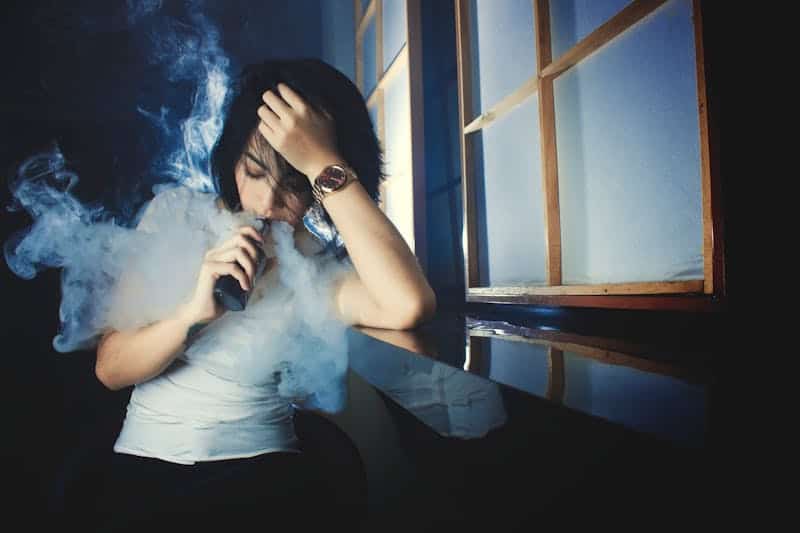
Potential Liabilities for Hotels
Hotels that fail to comply with local and state vaping laws and regulations can face significant liabilities. These liabilities can include fines, penalties, and potential lawsuits from guests who are exposed to secondhand aerosol or other vaping-related hazards.
Additionally, hotels that allow indoor vaping may be at risk of property damage caused by vaping devices, such as burns or stains on furniture and carpets. This can lead to costly repairs and replacements, further increasing the potential liabilities for hotels.
To mitigate these risks, many hotels have implemented strict no-vaping policies and clearly communicate these policies to guests. Some hotels have even gone as far as installing vaping detectors in guest rooms to monitor for vaping activity.
By staying informed about legal considerations and regulations, and implementing appropriate policies and measures, hotels can protect themselves from potential liabilities and ensure a safe and enjoyable experience for all guests.
Alternatives and Solutions for Vapers
Vape-Friendly Hotels
For vapers who can’t resist the urge to vape during their hotel stay, booking a vape-friendly hotel can be a game-changer. Many hotels have recognized the growing demand for vape-friendly accommodations and have adjusted their policies accordingly.
These hotels typically allow vaping in designated areas, such as outdoor patios or designated smoking rooms. Some even provide vape-friendly amenities like vape pens and e-liquids for purchase.
Nicotine Replacement Therapies
If you’re staying in a hotel that doesn’t allow vaping, nicotine replacement therapies (NRTs) can be a viable alternative. NRTs, such as nicotine gum, lozenges, or patches, provide a controlled dose of nicotine without the need for vaping.
These products are widely available over-the-counter and can help alleviate cravings and withdrawal symptoms during your hotel stay. However, it’s important to note that NRTs may not provide the same level of satisfaction as vaping, and some users find them less effective.
According to the National Library of Medicine, the success rate for quitting smoking with NRTs is around 50-60%.
Responsible Vaping Practices
If you choose to vape during your hotel stay, it’s crucial to practice responsible vaping etiquette. This includes being mindful of others and respecting the hotel’s policies. Here are some responsible vaping practices to keep in mind:
- Always check the hotel’s vaping policy and follow their guidelines.
- Avoid vaping in non-designated areas, such as guest rooms or common areas.
- Be discreet and considerate of non-vapers around you.
- Dispose of vape waste properly and avoid littering.
- Use low-wattage vape mods or devices that produce minimal vapor to reduce the risk of triggering smoke detectors.
By following these responsible vaping practices, you can enjoy your vaping experience while respecting the hotel’s rules and minimizing any potential disturbances or conflicts. Remember, being a courteous and mindful vaper can go a long way in promoting a positive image of the vaping community and ensuring that vape-friendly accommodations continue to be available for future travelers.
Conclusion
As vaping continues to gain popularity, the question of whether hotels can detect this activity remains a pressing concern for many vapers. While the detection methods and policies vary across different hotel chains and locations, it’s essential to approach this issue with responsibility and respect for others.
By understanding the intricacies of smoke detectors, hotel policies, legal regulations, and vaping etiquette, vapers can make informed decisions and navigate their vaping habits during hotel stays. Whether it’s exploring vape-friendly accommodations, practicing discreet vaping techniques, or considering alternative nicotine replacement therapies, this guide provides valuable insights and practical solutions.
Ultimately, open communication with hotel staff and a commitment to responsible vaping practices can go a long way in ensuring a pleasant and hassle-free stay for both vapers and non-vapers alike. By staying informed and respectful, vapers can enjoy their vaping experiences while minimizing potential conflicts or legal issues.

